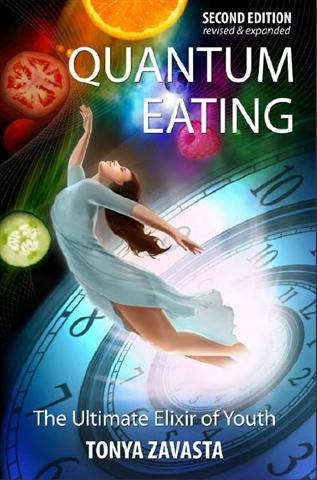Two Twin Secrets for Health and Longevity: Raw Quality … Low Quantity

Have you heard about the diet popular now: You eat once per day—all day long? Which is precisely what I did during my first year on a 100% raw food lifestyle. My consolation: I was eating raw. I used to think we can eat as much as we want as long as it is raw. This was true for me during my transitioning period. But no more! Nowadays I believe you should gradually strive for two meals per day—and the sooner the better. Your stomach needs rest.
Don't Eat All Day
Thomas Low Nichols writes in the 1881 The Herald of Health: Papers on Sanitary and Social Science: “[N]o child or adult should eat more than three times a day, with an interval of six hours between meals. This will give the stomach time to rest between digesting one meal, and beginning on another. And time to rest is the great want—the way to prevent dyspepsia (indigestion), and the absolute condition of cure. Four or five meals a day are what no stomach can long endure. Three meals are better; and for most dyspeptics two meals would be better still.”
The book goes further: “Overeating is an almost universal habit, and people eat from three to five times as much as is necessary. The work of disposing of this needless food exhausts the powers of life, and is itself a cause of many diseases. Our overeating is not only a waste of food, but it is a waste of life.”
Consider Pythagoras' Example
While researching my book Quantum Eating: The Ultimate Elixir of Youth, I looked in recent and more distant history for examples of people who have lived exceptionally long and healthy lives. It was a complete delight when I stumbled upon someone who managed to be handsome in the old age as well. That was the great mathematician Pythagoras. Yes, you do know who that is. “The square of the hypotenuse … ?" You remember—you’re just trying to blot it out!
Pythagoras’s first meal consisted of bread, honey, and olives. In ancient Mediterranean cultures, common diets included bread and honey. But one thing was constant: Very little food was consumed by Pythagoreans. Since the stove had not been invented, bread was unleavened and uncooked. History tells us: Pythagoras lived for the most part on bread and honey, with vegetables as dessert.
At Least Keep it Low Quantity
Holidays feasts are over—thank goodness! But not for long. Valentine’s Day is just around the corner. And temptations never leave us. When you’re at the table and helplessly looking for the absent raw baby carrots and cauliflower florets, you’ll be ready to give up. The heck with raw foods, you’ll think to yourself, and tuck into Aunt Edna’s eggplant tuna casserole. Remember that even if you fall off the raw food wagon, you can still save your day by ensuring you eat only very small amounts of forbidden foods.
A slip is NOT a mortal sin! If you think biting into cooked food has put you beyond redemption, I want to tell you: You can redeem yourself, after any bite, simply by not taking the next one. Eating raw is very good. Eating frugally is second best.
Go Raw and Low for Optimum Results
If Ellen White and others were able to live on two (not always raw) meals per day, how much better we can do now on two raw meals! History teaches us there are people who achieved good health and long lives on small meals. We also learn about people who cured themselves from various diseases by going raw. What can we learn from both strategies? I believe raw quality and low quantity are must for optimum health and anti-aging benefits. That is what my Quantum Eating is all about.
Keep it Simple
Jacob Bronowski, author of The Ascent of Man, says that “a genius is a person who has two great ideas.” Leo Tolstoy before him said: “All the really great ideas are simple.” Eat raw … eat little. There’s your two great ideas, and both of them dead simple. But the genius isn’t mine—it’s yours. Your genius—and the fabulous benefits you’ll derive—will come from the way you combine these notions to fit your body, your needs, your individuality, your health and your hopes.

